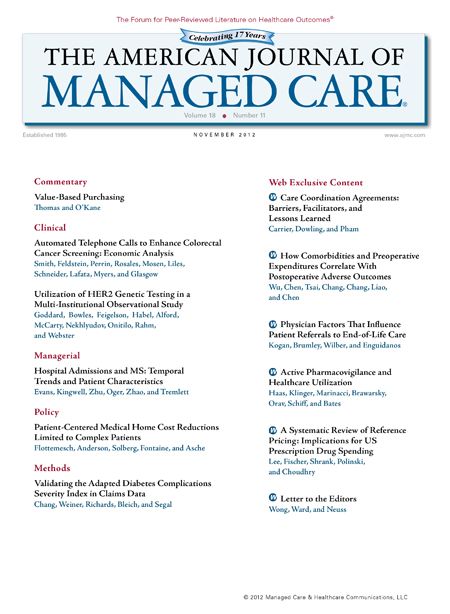- Center on Health Equity & Access
- Clinical
- Health Care Cost
- Health Care Delivery
- Insurance
- Policy
- Technology
- Value-Based Care
Transformation
Journal of Oncology Practice (JOP) and The American Journal of Managed Care (AJMC) join efforts to highlight work focusing on issues affecting payers and providers.
This article was published as part of a special joint issue and also appears in the Journal of Oncology Practice.One year ago, Journal of Oncology Practice (JOP) and The American Journal of Managed Care (AJMC) joined efforts to highlight work focusing on issues affecting payers and providers. The 2 journals share a desire to offer readers informed perspectives and data-oriented work. Such information informs policy makers and providers, ultimately leading to better clinical decisions and improved access to quality care. Our first effort was received well by our respective audiences; hence, we reprised the request for authors to submit work with the same focus. We received twice as many submissions, which underlines the interest in understanding the complex relationship between those who pay for oncology health services and those who provide it.
Sharpening attention on this topic is the tension between the desire for high-quality, accessible healthcare and the reality that our current healthcare system is not able to fulfill this desire at a cost that society is able to pay. Indeed, there is a growing awareness that healthcare delivery needs to focus on what truly matters to the patient, trimming away detritus that benefits only the provider or the payer. The terminology that describes these efforts has become cliché in current policy discourse—value-based purchasing, episode of care payment, bundling, patient-centered medical homes, accountable care organization, among others. The foundational hope behind all of these change efforts is to reform how we pay for care.
Another term that has joined current jargon describing change is “practice transformation.” Transformation conjures the vision of the dramatic transition of a larva to the beauty of a butterfly. Indeed, such dramatic evolution will be required of practices as they adapt to new payment models. Yet, this is not all about money. The sustenance of change at a patient-care level is the physician satisfaction of receiving feedback of definable improvements in care. The perspective pieces in this issue by Bosserman et al and Sprandio describe such changes in their practice transformational efforts, seeing measured enhancements in patient care and realizing a more beautiful practice. One suspects that most successful change efforts will be driven by dedicated physicians who chafe at current systems. Yet, as illustrated by these 2 authors, the only path that will drive these changes requires partnering with payers to jointly define success in patient-centered terms.
AJMC is an independent, peer-reviewed forum for the dissemination of research relating to clinical, economic, and policy aspects of financing and delivering efficient and highquality healthcare. Circulating to approximately 47,000 individuals with important decision-making responsibilities that affect the access to and use of healthcare resources, AJMC includes in its readership medical directors, pharmacy and therapeutics committee members, pharmacy directors, physicians, corporate benefits managers, and other healthcare professionals across 6 market segments: health maintenance organizations/ preferred provider organizations/integrated healthcare organizations, hospitals, long-term care, pharmacy benefit managers, Veterans Affairs/government, and employers.
JOP, the newer of the American Society of Clinical Oncology’s 2 research journals, provides oncology professionals with information to enhance practice efficiency and promote highquality patient care. The Journal aspires to become the authoritative resource on clinical and administrative management for practicing oncologists by including peer-reviewed original research, feature articles, and section columns on issues pertinent to daily practice operations. JOP is available to the American Society of Clinical Oncology’s worldwide membership of more than 30,000, which comprises clinical oncologists from all oncology disciplines and subspecialties, physicians and healthcare professionals participating in approved oncology training programs, oncology nurses, and other healthcare practitioners with a predominant interest in oncology.
The Editors appreciate authors who submitted their work in response to the call for papers and the efforts of the publication staff at AJMC and JOP for again making this issue a reality. We invite readers to send comments to jopeditorsdesk@asco.org. We wish you good reading.Author Affiliations: From Texas Oncology Methodist (JVC), Dallas, TX; University of Michigan (AMF), Ann Arbor, MI.
Authors’ Disclosures of Potential Conflicts of Interest
The authors indicated no potential conflicts of interest.
Author Contributions
Conception and design: John V. Cox. Administrative support: John V. Cox. Manuscript writing: John V. Cox, A. Mark Fendrick. Final approval of manuscript: John V. Cox, A. Mark Fendrick.

Quality of Life: The Pending Outcome in Idiopathic Pulmonary Fibrosis
February 6th 2026Because evidence gaps in idiopathic pulmonary fibrosis research hinder demonstration of antifibrotic therapies’ impact on patient quality of life (QOL), integrating validated health-related QOL measures into trials is urgently needed.
Read More

